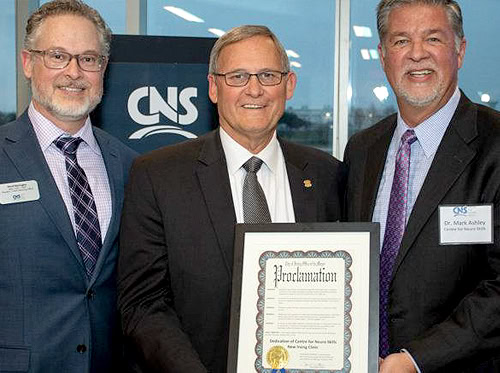Written by Patricia Robbins
Irving — Recovering from brain injury is one of the hardest things anyone will ever have to do. Irving has a newly expanded facility to help individuals with this arduous task.
The Centre for Neuro Skills (CNS), a premier provider of treatment for traumatic and acquired brain injury, held a grand opening event, Thursday evening, Jan. 30, for the company’s 40,000 square foot facility.
“I cannot think of a better work life than one that mitigates the suffering of other human beings,” David Harrington, CNS president and COO, said. “Helping people reclaim their independence is meaningful work. Because of this facility’s expansion, we can take as many as 40 more individuals and treat up to 120 patients per day. This has a meaningful impact on those individual lives, on this community, and quite frankly on our society.”

CNS covers a full spectrum of advanced care from residential and assisted living to outpatient/day treatment. CNS’ residential rehabilitation program will remain at its current location in Irving just six miles from the new facility.
“Across our organization, we’re treating about 350 patients a day,” Dr. Mark Ashley, CNS founder and CEO, said. “Doesn’t sound like a lot, but in our field, it actually is a lot. We’re one of the largest companies doing this work. We describe it as short term intensive rehabilitation. Our patients will get 11 to 17 hours of treatment a day, seven days a week. When you’re treating that intensively, you’re changing the brain.”
Kailey Tesdahl, a graduate of Centennial High School in Burleson, suffered a traumatic brain injury as a result of a car accident on her way to her 2017 high school graduation. She recovered in CNS’s residential facility in Irving for four months and then their Fort Worth outpatient facility for eight months.
“It was really good, because everyone was super nice and very patient,” Kailey said. “In the beginning, I was nonverbal. I had a lot of behavioral issues, and I beat up on all my therapists, but they didn’t think anything of it, because they knew it wasn’t me.”
Her mother, Stephanie, spoke about Kailey’s recovery.
“In September after the accident in June, I think she had a breakthrough,” Stephanie said. “It was like she her brain came out of a fog. She was in PT, and they were talking about going fishing. She turned to and said, ‘I don’t want to go fishing.’ I reassured her, ‘We’re not going to go fishing. Maybe next time.’ Later she said, ‘I don’t ever want to go fishing.’ That’s when I knew she was back.”
Today, Kailey is in her fourth semester at Hill College.
“I eventually want to go further and get a degree to be a therapist or counselor for brain injury and trauma,” Kailey said. She is also planning an awareness event with the nonprofit organization, Hope After Brain Injury.
“Our motto is, ‘Find a way,’” Ashley said. “If we’re going to be responsible for the successes that a patient has, we also have to claim responsibility for not being able to get the recovery. Our goal is to always innovate, to find a way to get that next level so that individual has the highest quality of life.
“Traumatic brain injury is far more prevalent than cancer by about three to four times across the U.S. When a person has this injury, they lose not only physical capabilities and communicative capabilities, but also cognitive capabilities. It’s very difficult for them to advocate for themselves. And because they require so much care and supervision and assistance, an entire family can be consumed by this.
“If a person is injured on the job, [the family loses] that breadwinner, and then if they have a spouse who is going to provide care, that person has to leave the workforce. These families can very easily go from fully independent to financially destitute. This happened in my family. When I was a teenager, my brother was injured while he was in the service. Having watched the impact on our family, I am very sensitive to what families go through. It’s our mission to change that.
“Some people wondered what they were going to do with their lives. I didn’t choose my career. It chose me,” he said.
CNS Monthly Newsletter
The latest CNS updates, including events, company information, and patient care developments
The Inside View
Quarterly magazine focused on brain injury research, rehabilitation, and advancements shaping the field
Sign-up for one or both to stay connected with brain injury news and recover